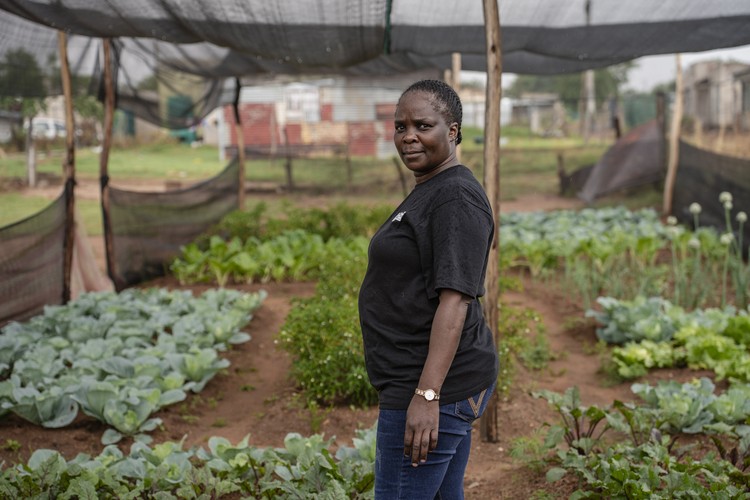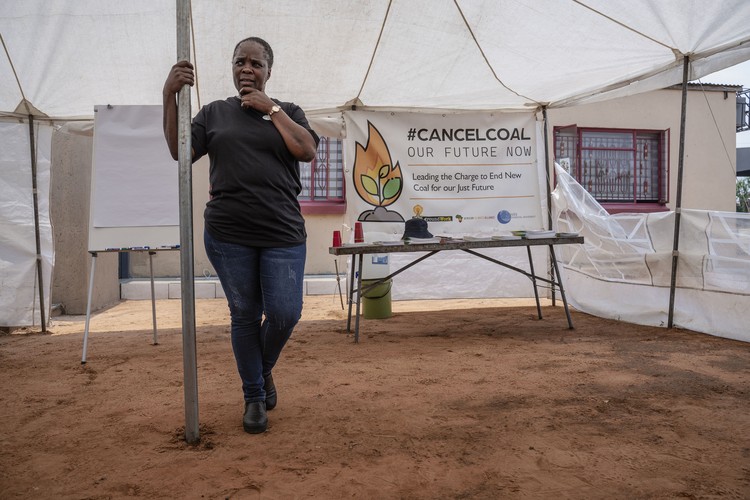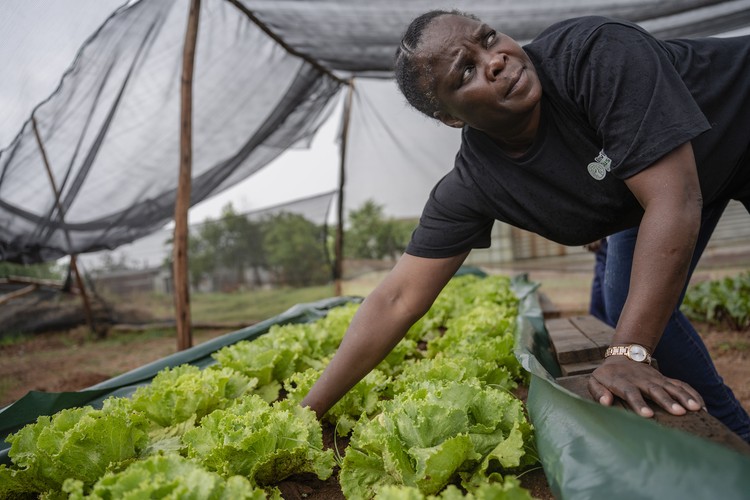Promise Mabilo’s child has asthma. She is fighting for cleaner air in Mpumalanga
“Living in Emalahleni is like living in a closed bottle. It’s difficult to breathe.”
Promise Mabilo started the Vukani Environmental Movement, a community-led organisation that campaigns for a better environment. Photos: Ihsaan Haffejee
- An environmental activist in eMpumelelweni township in Emalahleni, Mpumalanga, is determined to get government to improve air quality in the region.
- The air quality in the Emalahleni region is amongst the worst in the world.
- Promise Mabilo started the Vukani Environmental Movement which campaigns for a better environment.
- Mabilo has called for government to have more air monitoring stations and have more mobile clinics to monitor people’s health.
Promise Mabilo has been at the forefront in the fight against poor air quality and pollution in the Emalahleni region of Mpumalanga. Mabilo has lived in the region for well over two decades.
But her passion was ignited after watching her son’s health deteriorate as he developed breathing issues and was eventually diagnosed with asthma in 2008.
“Living in Emalahleni is like living in a closed bottle. It’s difficult to breathe,” she says. “How many other young children are facing the same challenge as my son? So I started mobilising people to join the air quality and health campaign.”
Her advocacy for better air quality led Mabilo to start the Vukani Environmental Movement (VEM), which campaigns for a better environment.
The organisation, based in eMpumelelweni, runs public awareness campaigns on air, water and waste issues affecting the community. It has also encouraged young people in the community to start a recycling project and a food garden.
The air quality in the Emalahleni region is amongst the worst in the world. A Greenpeace-commissioned study found that “Kriel in Mpumalanga, with its high concentration of coal-fired power stations, ranks as the second worst sulfur dioxide emission hotspot in the world” behind Russia’s Norilsk region.
Emalahleni is rich in coal reserves and is home to the many power stations that dominate the nearby landscape. The emissions from these power stations are the main contributor to the poor air quality in the region.
The Highveld Priority Area was formally declared a pollution hotspot in terms of the National Air Quality Act by the environment minister in 2007.
Promise Mabilo at the head office for the Vukani Environmental Movement.
Landmark case
In 2019, the Vukani Environmental Movement, together with environment activists at groundWork, were represented by the Centre for Environmental Rights as they launched a landmark case. The groups took the government, in particular the environment minister, to court in 2019 for failing to make regulations that enforce the Highveld Priority Area Air Quality Management Plan. It became known as the Deadly Air case.
The applicants’ case depended on Section 24 of the Constitution, which guarantees the right to an environment not harmful to health or wellbeing. They won. Judge Colleen Collis ruled on 18 March 2022 that government’s failure to implement regulations violated the Constitution. She ordered government to make the necessary regulations to enforce the Act.
The Minister of Forestry, Fisheries and the Environment appealed this. The matter was heard in the Supreme Court of Appeal (SCA) on 28 August. Two days before the appeal hearing, the new minister, Dion George, published the necessary regulations. VEM and groundWork are studying these regulations to determine if they are adequate. Meanwhile the SCA has reserved judgment.
Promise Mabilo working in one of the food gardens that Vukani Environmental Movement helped to start in the township of eMpumelelweni.
Long way to go
While Mabilo lauded the court victory, she says that the reality for people living in communities like hers has not changed much.
“We are really far from the outcomes of the judgment. We should have seen more air monitoring stations, more training for locals, additional mobile clinics to monitor people’s health. But we are not seeing anything practical,” said Mabilo.
She believes an informed and educated younger generation is essential to creating a different future for the region as the world slowly moves away from coal.
“We have to work hard to create new types of jobs around the Just Transition and save the lives of the younger generation,” says Mabilo, who recognises the complicated nature of the transition in an area where so many people still greatly rely on the coal industry.
The life of an activist is challenging, tiring and sometimes dangerous, but Mabilo says she is motivated to continue fighting for a future where young children can live and breathe in a cleaner environment.
“People accuse us of being anti-development and denying progress, but that is not the fact. The fact is our children are dying,” says Mabilo.
Support independent journalism
Donate using Payfast

Don't miss out on the latest news
We respect your privacy, and promise we won't spam you.
Next: City extends public comment on sale of old Woodstock Hospital
Previous: Security guards shot while escorting garbage collectors in Cape Town
© 2024 GroundUp. This article is licensed under a Creative Commons Attribution-NoDerivatives 4.0 International License.
You may republish this article, so long as you credit the authors and GroundUp, and do not change the text. Please include a link back to the original article.
We put an invisible pixel in the article so that we can count traffic to republishers. All analytics tools are solely on our servers. We do not give our logs to any third party. Logs are deleted after two weeks. We do not use any IP address identifying information except to count regional traffic. We are solely interested in counting hits, not tracking users. If you republish, please do not delete the invisible pixel.



